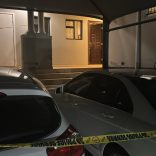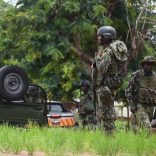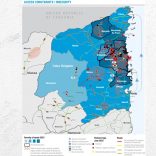Mozambican kidnapping mastermind killed in Johannesburg - AIM report
Mozambique: Police use tear gas to disperse ‘paid ride’ drivers – Watch

Screen grab: Miramar
Mozambican police fired tear gas on Tuesday to disperse a group of “paid ride” drivers in the city of Maputo who were protesting to keep their cars moving, a few metres from the Mozambican Presidency.
“The municipal police arrived here, telling us to leave the area, and they behaved aggressively. However, we understand that cooperation is the better way to deal with things. So far, we have not received any notification, and we are the ones with the legal proceedings underway to legalise our rank,” Eugénio Mathe, one of the drivers, told the media.
Videos circulating on social media show municipal police blocking and towing cars parked along Julius Nyerere Avenue, near the Mozambican Presidency, because, according to the drivers, the officers had prohibited parking in that location and were exercising their authority.
The drivers contested the measure, choosing not to remove their cars from the site and leaving some vehicles behind.
“We stay here because this is where we earn our living. I think we may have to fight them for bread because going out on the streets to steal is not right,” said another driver, who did not justify the police violence. The police contingent arrived and immediately fired tear gas, which interrupted his statements.
The police also arrested at least one person, according to reports from the scene.
Lusa contacted the Mozambican Police (PRM) for clarification, which committed to providing further details later.
Over the last five years, the city of Maputo has seen a phenomenon of expansion of alternative means of public transport, such as “paid rides”.
Parked at various points in the Mozambican capital and operating between morning and late evening, “paid rides” emerged during the Covid-19 pandemic in 2019 due to the restrictions in place at the time.
The drivers of “paid rides” acknowledge that the activity has not yet obtained legal status, but say that the municipal council has passed the case to the public prosecutor’s office, which in turn has authorised the services to continue while the group’s association is being formalised.
“The public prosecutor came here to look into the matter, and we submitted a document, and he said to continue working while the documentation is being organised. At the moment, we are working and must keep going, because we have these vehicles, we have borrowed money from banks (…), and we must keep our activity running. We will negotiate while we are working,” said Salomão Nhaca, one of the drivers.
The man asked the Mozambican authorities to let them operate or to identify another stopping point along the same avenue, where the “paid ride” customers are located.
“What we are seeing in this country is that, to accommodate their ideas or plans, they change the laws. Why can’t they change the law for us here at ‘paid rides’?” asked Salomão, while the siren of the police contingent approaching the scene could be heard in the background.
The transport sector in Mozambique has significant growth potential, particularly in public services, including road transport.
The public transport crisis has led to the use of private open-bed vehicles, popularly known as ‘My Love’, given the physical proximity with which passengers travel in the cargo area and the need sometimes to hug each other to stay secure on the road.












Leave a Reply
Be the First to Comment!
You must be logged in to post a comment.
You must be logged in to post a comment.